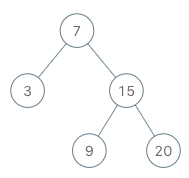Question
Implement an iterator over a binary search tree (BST). Your iterator will be initialized with the root node of a BST.
Calling next() will return the next smallest number in the BST.
Example:

Note:
next()andhasNext()should run in average O(1) time and uses O(h) memory, where h is the height of the tree.- You may assume that
next()call will always be valid, that is, there will be at least a next smallest number in the BST whennext()is called.
Difficulty:Medium
Category:Stack, Tree, Design
Analyze
Solution
Using stack solve this problem.
/**
* Definition for a binary tree node.
* struct TreeNode {
* int val;
* TreeNode *left;
* TreeNode *right;
* TreeNode(int x) : val(x), left(NULL), right(NULL) {}
* };
*/
// Runtime: 48ms
class BSTIterator {
public:
BSTIterator(TreeNode* root) { inorder(root, s); }
/** @return the next smallest number */
int next() {
int x = s.top();
s.pop();
return x;
}
void inorder(TreeNode* root, std::stack<int>& s) {
if (!root) return;
inorder(root->right, s);
s.push(root->val);
inorder(root->left, s);
}
/** @return whether we have a next smallest number */
bool hasNext() { return s.size(); }
private:
std::stack<int> s;
};
/**
* Your BSTIterator object will be instantiated and called as such:
* BSTIterator* obj = new BSTIterator(root);
* int param_1 = obj->next();
* bool param_2 = obj->hasNext();
*/